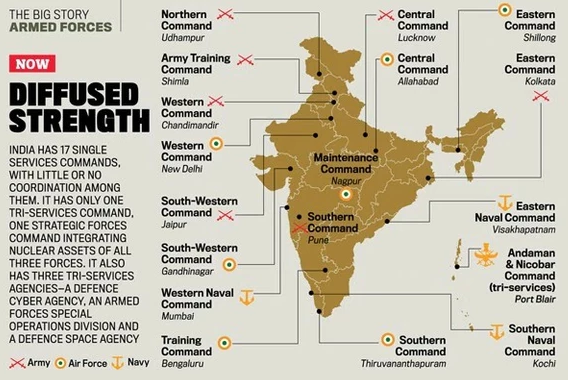Internal Security
India’s Military Convergence
This article is based on Getting India's military convergence formula right which was published in The Hindu on 26/07/2021. It talks about the issues facing the reorganisation of armed forces and ways to tackle them for effective defence capability.
Given the key geostrategic challenges, emanating from the threat of two-front war (against China and Pakistan combinedly), India faces the complex threats and challenges spanning the full spectrum of conflict from nuclear to sub-conventional. Thus, required reorganisation of the armed forces for effective and efficient utilisation of its resources.
Meanwhile, the Chief of Defence Staff (CDS) General Bipin Rawat’s description of the Indian Air Force (IAF) as a supporting arm and the IAF chief Air Chief Marshal’s rebuttal, is the newest bump in the turbulent journey marking the reorganisation process of the armed forces.
The reform in the military organization, thus, is marred by various challenges which are needed to be resolved.
Issues Before Reorganisation of Forces
- Issue With Synergising: With dwindling budgets, a steadily deteriorating security situation and the march of technology, the armed forces understand the need to synergise. But natural human faults interfere.
- For instance, different services do not coexist well where they are co-located. Bitter fights over land, buildings, facilities, etc. mar optimal operational synergising.
- Lack of Substantial Operational Charter: There is the issue of giving each other the best, or of wanting to be with each other.
- The Andaman and Nicobar Command suffered from the lack of a substantial operational charter, and the services not positioning appropriate personnel or resources there.
- Moreover, as a joint tenure did not benefit career, no one strove for it.
- Acute Indigence And Shrunken Economy: The biggest challenge India’s military faces is monetary in times of acute indigence and a shrunken economy, hammered further by the ongoing Covid-19 pandemic.
- Shortage of Physical And Human Resources: Media reports suggest that the IAF is 25% short on fighter squadrons, even after counting ageing aircraft.
- A pan service shortage of about 400 pilots, almost 10% of their authorised strength, further aggravates this.
- Therefore, the IAF warns against splitting assets as there may be nothing much to split.
- Used Outside the Services: But shortage alone is not at the core of the IAF’s objections. There is also the prospect of operational plans for the IAF being made outside the service.
Air Force As Supplementary Power
- Armies and navies will see air power as a supplement, history being the reason.
- Analysing the experience of the United States, the air power theorist Tami Davis Biddle wrote in 2019 that ‘aerial bombing cannot control the ground’.
- It is an important and much-utilized military instrument for both deterrence and compellence. However, its ability to produce results varies, and students of strategy must understand the circumstances under which it is more or less likely to achieve particular results or political ends’.
- Holding and controlling land or water is essential in conflict.
- From Vietnam to Afghanistan, air power failed to deliver the promised results to the USA. But everyone acknowledges how greatly air power can aid victories though.
Difference In Opinion of Three Services
- ARMY – In favour:
- It is time to move away from a service specific approach to operations towards a system which avoids duplication, ensures optimum utilisation of available resources.
- AIR FORCE – Strongly opposed
- It doesn’t have enough resources — fighter squadrons, mid-air refuellers and AWACS — to allocate them dedicatedly to different theatre commanders.
- It believes that India is not geographically large enough to be divided into different theatres, as resources from one theatre can easily be moved to another theatre
- NAVY - More nuanced, it too is not in favour of implementing the proposal currently
- The current model of control by the Navy Headquarters is ideally suited for its strategic role.
- There are also underlying fears about the smaller Services losing their autonomy and importance.
Way Forward
- Comprehensive National Security Strategy: There is the need for a comprehensive National Security Strategy to guide the services develop capacities required in their respective domains.
- Transform Professional Education: It is needed to transform professional education and inter-service employment to nurture genuine respect for others.
- Resolve The Differences: The armed forces must resolve their differences among themselves, as the politicians or bureaucrats cannot do it.
- Need For Adequate Human Resources: To ensure good quality staff, in adequate numbers, at apex joint organisations, to reassure individual services and those in the field that they are in safe hands.
- Problem Specific Solutions: Need to accept the fact that what works for other countries need not work for us. We need tailor-made solutions which may need more genuine thinking.
- For genuine military jointness, a genuine convergence of minds is critical.
- Clear And Written Concepts: Major reorganisations must strictly follow the sequence of written concepts, their refinement through consultation, simulation or tabletop wargaming, field evaluation and final analysis before implementation.
- This would help address command and control, asset adequacy, individual service roles, operational planning under new circumstances and the adequacy of joint structures.
- The Western Command between the Indian Army and the IAF, the Northern Command with the Indian Army, Maritime Command with the Indian Navy and the Air Defence Command with the IAF may be an acceptable formula.
Conclusion
Changing dynamics of national security which now encompasses cyber, automation and such new challenges, cannot be solved by a disjointed general but rather a clear and robust structure that should quickly respond to emergent situations.
|
Drishti Mains Question For genuine military jointness, a genuine convergence of minds is critical. Discuss the statement with reference to creation of Integrated Theatre Commands. |





